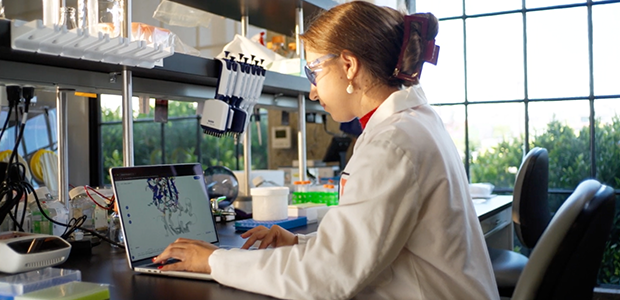
Designing drugs at the push of a button: Latent Labs launches Latent-X
Latent Labs is launching Latent-X, a frontier AI model for push button protein design, outperforming competing models under identical laboratory conditions.
The model is available for early access on Latent's no-code AI protein design platform, where users can upload protein targets and generate cyclic peptides and mini-binders directly in the browser. Through the platform, users can generate, explore, and score binder designs, selecting top-ranked structures for further lab testing. The platform includes a free tier for both commercial and non-commercial users.
Latent Labs is a frontier AI lab working to transform the expensive, labour intensive, and high failure rate processes of drug discovery into automated drug design. Traditional drug discovery requires screening upwards of tens of thousands of random molecules – a process where hit rates are typically well below 1% and each experiment takes months and costs thousands of dollars. With Latent-X, drug designers can generate high-confidence binders with the push of a button, achieving what would typically require testing tens of thousands of candidates by testing as little as 30 candidates per target.
AI models have recently enabled solutions to previously insurmountable technical challenges in biology. With generative models, frontier AI can go beyond predicting structures to creating new sequences and structures of candidate drugs.
"We envision a future where effective therapeutics can be designed entirely in a computer, like semiconductors or space missions," said Simon Kohl, CEO and Founder of Latent Labs. "Our platform empowers scientists with lab-validated protein binder design at their fingertips, whether they're experts or new to AI-powered drug design, and without needing AI infrastructure. This is the first step on our mission toward making biology programmable in order to make drug design instantaneous."
Latent-X generates functional, high affinity de novo binders with breakthrough laboratory performance. In extensive wet lab experiments across seven therapeutic targets, Latent-X achieved 91-100% hit rates for macrocycles and 10-63% hit rates for mini-binders.
The model delivered picomolar binding affinities for mini-binders and single-digit micromolar affinities for macrocycles, with generated binders showing strong target specificity. In head-to-head experimental comparisons, Latent-X exceeded the prior state-of-the-art, outperforming existing generative tools in both in silico evaluations and laboratory validation. Macrocycles are a sought after drug modality for their potential oral deliverability, with their compactness promising tissue permeability while retaining specificity. Mini-binders are a versatile new binder modality that offers high specificity in a flexible format.
The Latent Labs platform allows users to access the state of the art in protein binder design in an intuitive platform for target upload, hotspot selection, binder design, and computational ranking. The platform features structure visualisation, predicted structure overlays, and computational metric rankings allowing to replicate the AI workflows used to generate our successfully lab-validated binders.
Latent-X is a general purpose frontier model that creates binders from scratch for unseen or previously untargeted proteins, solving the geometric puzzle of binding at the all-atom level. The model generates designs over 10x faster than previous methods and co-samples sequence and structure simultaneously, allowing for close to real time computational experimentation. Latent-X generalises beyond nature's repertoire by generating all-atom binder structures that obey atomic-level biochemical rules, opening doors to other therapeutic modalities that depend on target-specific binding – nanobodies and antibodies being prime examples. The company is now open to partnerships to bring these expanded capabilities to new drug applications.
Only five months ago Latent Labs announced its $50 million funding round co-lead by Radical Ventures and Sofinnova Partners, with participation by Google’s Chief Scientist Jeff Dean, Anthropic’s CEO Dario Amodei and Eleven Labs’ CEO Mati Staniszewski. The team consists of former AlphaFold 2 co-developers, ex-DeepMind team leads, and brings rich experience from Microsoft, Apple, Stability AI, Exscientia, Mammoth Bio, Altos Labs, and Zymergen.
For more startup news, check out the other articles on the website, and subscribe to the magazine for free. Listen to The Cereal Entrepreneur podcast for more interviews with entrepreneurs and big-hitters in the startup ecosystem.

